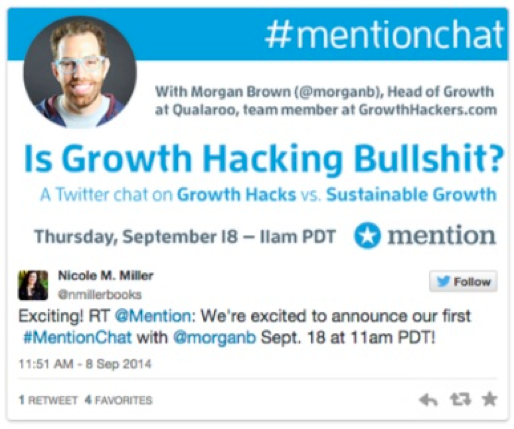Community exists somewhere in the stratosphere of product, customer service, marketing, and blowing people’s minds with unforgettable user experiences.
Founders often do not fully grasp how community fits into the larger framework of what they’re building. Community is a cross between getting the word out (marketing), making people feel good (customer service, user experience), and developing something world-changing (product, brand).
In order to understand what community means for your startup, you first need to understand what community is not.
Again and again, I hear four common misconceptions about community management for startups. I’ll debunk these four myths in order to shed light on the real power behind community management.
Common Mistakes about Community Marketing
1. Community building is not public relations
Community building should actually work in the reverse. That is, you shouldn’t “stage” community events or bring people together simply to get press. That’s not the point, and yet so many companies fear investing in real community-building because they won’t see an immediate uptick in traffic or sign-ups simply because they were featured in TechCrunch.
If you attempt to control your community too much and only talk about your users, you’re building a marketing message — not a community.
The main job of an effective community builder (and often the first job of a new community hire) is to build relationships. To do so, community builders host events, drive user-centric product discussions, and make partnerships that catapult a company from “producer of product” to a “leader of movement.” That oftentimes makes for an awesome story in the press.
But a community builder’s goal is never to get that story. Our goal is to give users something special, to tell their stories, and to encourage them to share with others.
For examples of startups that leverage community to create PR-worthy moments, think:
· Yelp’s Elite Events
· Product Hunt’s happy hours
2. Community building is not social media listening, conversation, or content creation
Many founders believe that community building is simply talking to users on Facebook or Twitter. Sure, relationships do begin this way. Most of us community builders are active on social networks because we use them as a tool to reach influencers, potential community members, and partners.
But a conversation is not a community. Your followers on Twitter are not your community. Your Facebook fans are not a community.
A true community consists of your users talking to one another online and offline about what your product allows them to do (ideally, within your product environment). That is powerful stuff that creates organic evangelism and better products.
If you start building community through Facebook, that can be a great way to start. In fact, many communities begin through Facebook Groups, which is a good launching point or place to validate the concept of your community (Lyft used Facebook groups almost entirely until deciding to switch over to an integrated Salesforce solution).
If you’re looking to acquire new users through fancy blog posts or funny Vine videos, hire a content marketer or social media manager instead of a community builder.

Twitter Chats, like this one from Mention, certainly can be a great way to gather your users in one place online for a short period of time.
3. Community building is not moderating a forum
Sure, moderating forums can be a daily activity for many community managers. Forums work for many communities, and they have been working for decades. For some community builders, seeking content or finding moderators is a big part of the initial workload.
But the goal (take Reddit as an example) is to find community members who will carry the torch for you and moderate on your behalf. That’s where super-user status and tiers of users come into play.
There are many community products now that work like modern forums. Product Hunt, Hacker News, Inbound.org are all examples of modern-looking forum-like platforms for communities. If you or your community manager is doing all of the moderating manually on a product like this and not ceding any power to your users, you’re doing it wrong.

Reddit has an entire toolbox extension for its moderators, all community volunteers.
4. Community building is not a campaign, contest, or club
Community management is not a one-off thing. It’s not a contest you run on Pinterest once or a conversation you have around a hashtag that ends soon after it begins.
Community is a long-term investment. Investing in short-term programs can certainly be a good idea, as individual programs are often excellent growth engines for community. But you cannot invest once and then forget about it. You must keep delivering value and talk with your members.
If you do plan to invest in community programs, they must be part of a larger community-building strategy. Doing one book club/study group/meetup (whatever makes sense for your product) or one contest does not a community build.
Thoughtfully invest in others and they will invest in what you build.
I’ll end with a definition of what a community means.
On the users’ behalf, a community is belonging to a group larger than yourself in which you share common interests or goals.
On the builders’ behalf, a community is an intricate framework of relationships with users (and future users) that will drive your product into new places and make it more powerful than you ever thought it could be.
Community management is still an emerging field that’s being defined on a daily basis by amazing professionals at Lyft, Waze, Spotify, Instagram, and more. Figuring out a way to make it work for your startup will mean the difference between wasting money into a marketing engine or creating a tight-knit group of supporters who will spread the word about your product and mission on your behalf.




